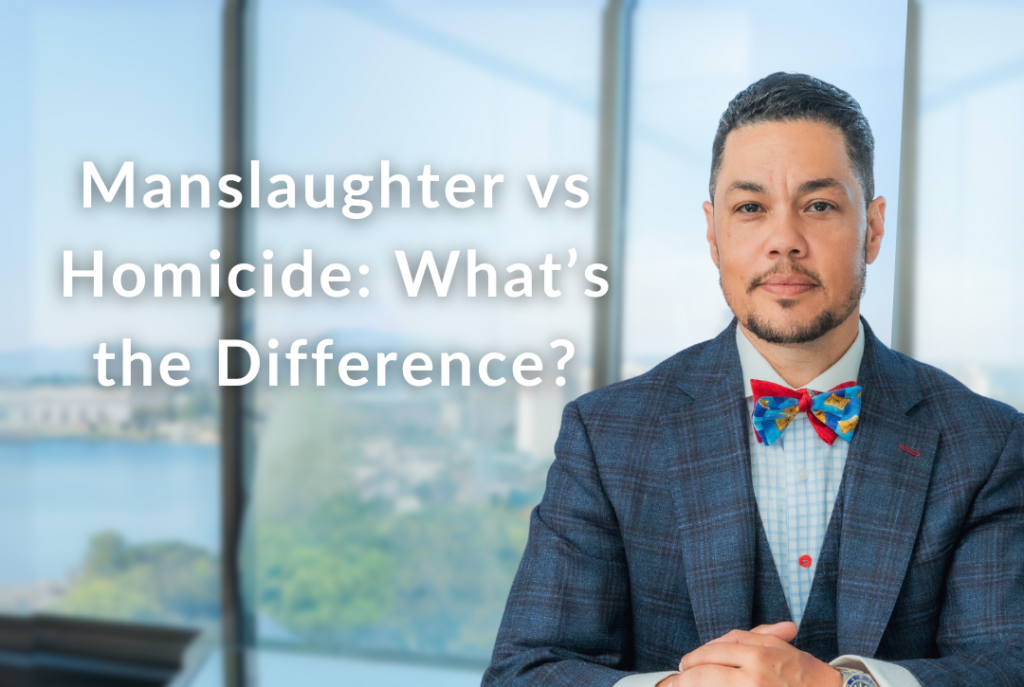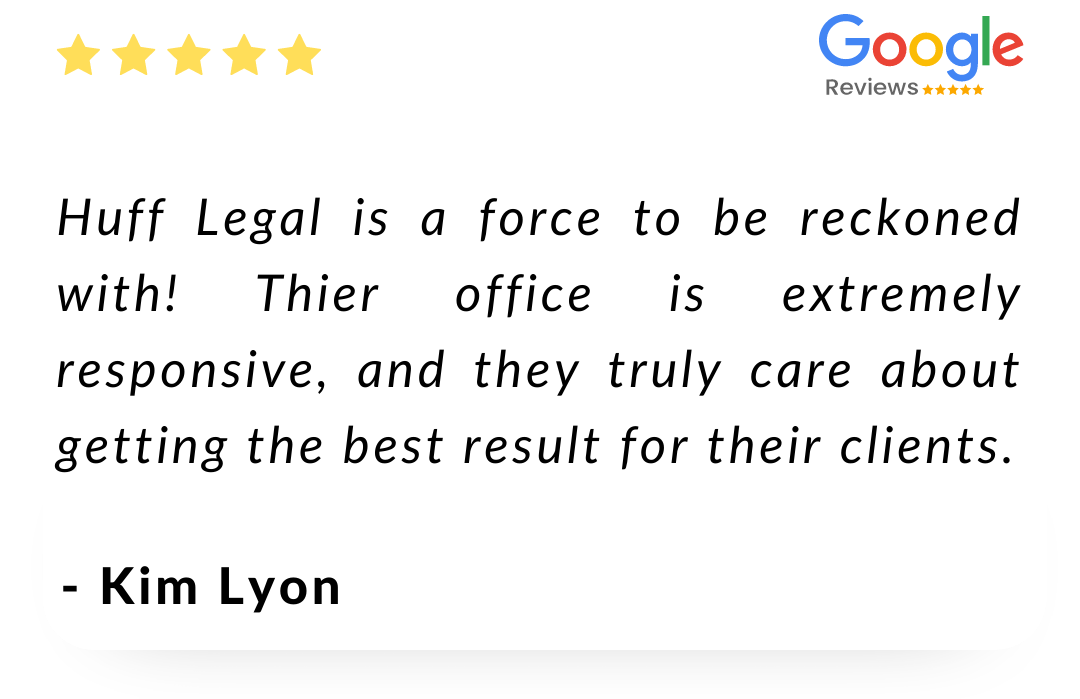Manslaughter vs Homicide: What’s the Difference?
Manslaughter vs Homicide: What’s the Difference?
When it comes to criminal charges, understanding the difference between manslaughter and homicide can significantly impact the outcome of a case. Manslaughter vs. homicide often confuses people because both involve the act of taking a human life.
However, the key difference lies in the intent behind the action. Manslaughter refers to an unlawful killing without intent or premeditation, often committed in the heat of the moment, whereas homicide includes all forms of killing, both lawful and unlawful.
Today, we’re breaking down the essential distinctions, helping you understand these complex legal terms and what they could mean for you if you’re facing serious charges.
Understanding Manslaughter vs. Homicide
Manslaughter and homicide both involve the taking of a life, but they differ in terms of intent and legal classification. Understanding these differences is crucial, especially when dealing with legal charges that could lead to serious penalties.
Manslaughter
Manslaughter is the unlawful killing of a person but without the intent or premeditation found in murder. It is generally divided into two categories:
- Voluntary Manslaughter: This occurs when a person kills someone in a sudden act of passion or provocation without prior intent to kill. An example could be a heated argument that escalates into violence, resulting in death.
Involuntary Manslaughter: Involuntary manslaughter involves unintentional killings that occur due to reckless or negligent actions, such as a fatal car accident caused by a distracted driver.
What Are Penalties for Manslaughter?
Voluntary Manslaughter (Penal Code 192(a)):
- Prison Time: Up to 11 years in state prison
- Fines: Fine of up to $10,000
- Additional Consequences: Counts as a “strike” under California’s Three Strikes Law
Involuntary Manslaughter (Penal Code 192(b)):
- Prison/Jail Time: 2, 3, or 4 years
- Fines: Fine of up to $10,000
- Additional Consequences: Counts as a “strike” if a firearm or deadly weapon was involved
Request a Free Consultation
Homicide
Homicide is a broader term that refers to the killing of one person by another. It includes both lawful and unlawful killings. Murder is a type of unlawful homicide, whereas lawful killings, such as those in self-defense, are excusable.
- Criminal Homicide: This includes both manslaughter and murder. Murder, a more severe form of homicide, is defined by intent and premeditation.
- Non-Criminal Homicide: Certain acts of homicide, like those committed in self-defense or by law enforcement in specific circumstances, are considered justified and not criminal.
What Are Penalties for Homicide?
The penalties for homicide depend on whether it’s a criminal or non-criminal act.
Murder Penalties:
- First-Degree Murder (Penal Code 187):
- Prison Time: 25 years to life in state prison
- Life Without Parole (LWOP): Possible if it was a hate crime
- Death Penalty: Possible in capital murder cases with special circumstances
- Second-Degree Murder (Penal Code 187):
- Prison Time: 15 years to life
- Increased Sentences for Specific Circumstances:
- 20 years to life for drive-by shootings
- 25 years to life if the victim was a peace officer
- LWOP is possible for repeat offenders or certain circumstances involving peace officers
Additional Penalties for Murder:
- Firearm Use: An additional 10, 20, or 25 years to life added if a firearm was used
- Three Strikes Law: Counts as a “strike”
- Other Enhancements: Possible for gang-related offenses
- Victim Restitution and Fines: Up to $10,000
- Permanent Loss of Firearm Rights: After conviction
Manslaughter vs. Murder: Key Distinctions
The key difference between manslaughter and murder lies in intent. While manslaughter involves an unlawful killing without malice or premeditation, murder requires both intent and premeditation.
Difference Between Manslaughter and Homicide
Murder is a type of homicide characterized by intent and planning. Homicide, as a broader category, includes all killings, whether lawful or unlawful.
Murder vs. Manslaughter vs. Homicide
Each term carries different implications regarding intent, circumstances, and penalties, which can have significant consequences for those involved in a criminal case.
Homicide: The Broadest Category
Homicide refers to the act of one person killing another, and it can be either lawful or unlawful, depending on the circumstances.
Unlawful Killing vs. Lawful Killing
Homicide is not always illegal. Lawful killings can include cases of self-defense or situations where law enforcement uses necessary force. On the other hand, unlawful killings involve intentional or reckless actions that result in death, such as murder or manslaughter.
Degrees of Intent
Intent plays a significant role in distinguishing types of homicides. Lawful killings often lack intent to harm, while unlawful killings may involve varying levels of intent or negligence. The degree of intent affects whether a homicide is considered murder, manslaughter, or another criminal offense.
Murder: The Deliberate Act
Murder is a type of homicide that involves deliberate intent to kill or cause grievous harm.
Elements of Murder
For a killing to be classified as murder, certain elements must be present: malice aforethought, premeditation, and intent to cause serious harm or death. These elements distinguish murder from less severe charges like manslaughter.
Degrees of Murder
Murder is divided into first-degree and second-degree categories:
- First-degree murder involves premeditated and intentional killing.
- Second-degree murder refers to intentional killing without premeditation but still involves malice aforethought.
Homicide vs. Murder
While all murders are homicides, not all homicides are murders. Homicide is the broader term that includes both lawful and unlawful killings. Murder, however, specifically refers to an unlawful killing done with intent or extreme recklessness.
Manslaughter: The Unplanned Killing
Manslaughter is another form of homicide but differs from murder in that it usually lacks intent or premeditation.
Voluntary Manslaughter
Voluntary manslaughter occurs when a person kills another in the “heat of passion” or during an emotionally charged situation. While the killer may have intended to harm, the actions were not premeditated.
Involuntary Manslaughter
Involuntary manslaughter involves unintentional killing that results from reckless or negligent behavior, such as causing a fatal accident while driving under the influence.
Vehicular Manslaughter
Vehicular manslaughter is a specific form of involuntary manslaughter where someone causes a death due to negligent or reckless driving. It can also involve driving under the influence or engaging in illegal activities while driving.

As Seen On












Key Factors Contributing to Homicide, Murder, and Manslaughter Charges
When facing serious charges like homicide, murder, or manslaughter, understanding the core factors is essential. Here are the key elements:
Intent and State of Mind
The intention behind the act heavily influences the charge. Premeditation typically leads to murder charges, while accidental deaths often result in manslaughter.
Preceding Circumstances and Motivation
Why did it happen? Self-defense could reduce charges, while personal motives like anger may escalate the case.
Legal Consequences and Penalties
Penalties range from probation to life in prison or even the death penalty, depending on the severity of the act and the circumstances.
Defending Against Murder and Manslaughter Charges
Getting the right legal defense can make all the difference. Common defense strategies include:
Self-Defense
If you can prove you acted to protect yourself or others, this defense could lower or dismiss charges.
Insufficient Evidence
Without enough evidence, charges may be dropped. Your lawyer can challenge weak or illegally obtained evidence.
Accident
Arguing that the incident was an accident, not a crime, could lead to lesser penalties or acquittal.
A skilled attorney can help navigate these defenses and ensure your rights are protected.
What Clients Say About Us





Schedule Your Free Consultation Today
FAQs About Manslaughter vs. Homicide
What Is Worse: Homicide, Murder, or Manslaughter?
Murder is generally seen as worse than manslaughter or homicide. It involves intent to kill, which carries the most severe penalties. Homicide is a broader term that includes both lawful and unlawful killings.
What Is an Example of Manslaughter?
Manslaughter is when someone kills another person without premeditation. An example would be killing someone in a car accident due to reckless driving. It’s an unlawful act but lacks intent to kill.
What Is an Example of Murder?
Murder involves premeditated intent to kill. A common example is planning and executing the killing of someone for revenge or financial gain. Murder is punished more severely than manslaughter.
What’s the Difference Between Homicide and Murder?
Homicide refers to any act of killing a person, lawful or unlawful. Murder is a type of homicide where there’s intent and malice behind the act. So, while all murders are homicides, not all homicides are considered murder.
Can You Be Charged With Murder for Defending Yourself?
If you killed someone in genuine self-defense, you typically cannot be charged with murder. However, proving self-defense is key, and it’s best to have legal support to protect your rights. Each case will depend on the evidence and circumstances.
Contact Huff Legal Today
When facing serious charges like manslaughter or homicide, the stakes are incredibly high, and understanding the nuances is critical to building a strong defense. These cases require careful analysis and expert legal strategies to ensure the best possible outcome.
At Huff Legal, we specialize in criminal defense, including complex manslaughter and homicide cases. Our experienced team can provide the support and representation you need to navigate the legal process.
Contact us today for a free consultation to discuss your case and get the legal guidance you deserve.
LET HUFF HELP YOU
As a former police officer and patrol supervisor and his time spent as a United States District Court Judicial Law Clerk to the Chief Judge, Attorney Huff knows how to navigate all levels of the complex criminal law system. We also have more than 55 years of combined experience dealing with various complex criminal legal matters and have helped just over 1,500 clients over the past few years.
Why Huff Is Your Best Option For Criminal Defense
55+ Years of Combined Experience
At Huff Legal, we have more than 55 years of combined experience dealing with complex criminal legal matters, which can oftentimes be quite challenging. In order to get the outcome you deserve, you need a team of experienced attorneys on your side, who can help you navigate the legal system, so you can move past this situation and focus on the life ahead of you!
5 Star Rating on Google
We have a proven track record of success and are dedicated to our clients’ best interests. If you’re looking for a law firm that will always have your back, look no further than Huff Legal. Just have a look at some of our amazing client reviews over here!
1,500+ Happy Clients
Over the years, we’ve had the privilege of helping over 1,500 clients with their legal needs. When you work with us, you can be confident that you’re getting the best possible legal representation. We’re proud of our track record and our reputation for being a firm that delivers great results.
What Our Clients Say About Us


Sheila


Abel Resendiz


Manuela Frazier


Doris
Contact Huff Today
Request A Free Consultation
* Free consultations only available for Criminal Defense


In legal terms, an accessory to murder refers to an individual who aids, abets, or otherwise assists in committing a murder. While the specifics may vary across jurisdictions, California law treats accessories to murder as active participants in the crime, holding them accountable for their actions. In San Francisco Bay Area, there are two primary types of accessories to murder:
In the event that you find yourself in the Bay Area facing accessory to murder charges, you should first call a criminal defense attorney who can help you defend your rights and lessen the effects of the investigation. Contact an attorney at Huff Legal as soon as possible following your arrest. An accomplished attorney from Huff Legal will thoroughly examine your case, who will then develop a strategy and build a defense.
